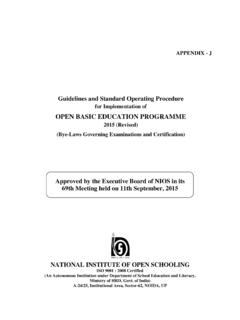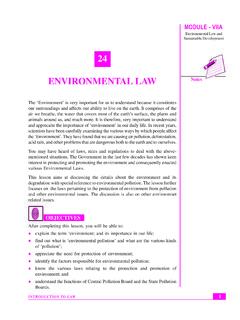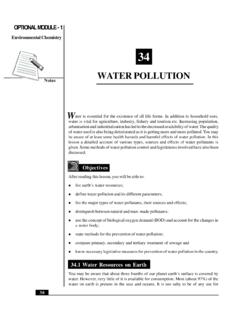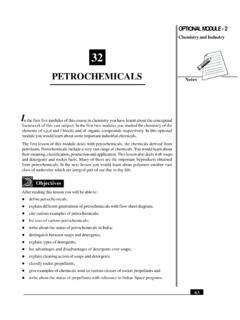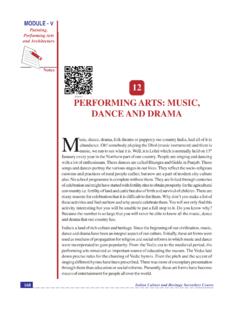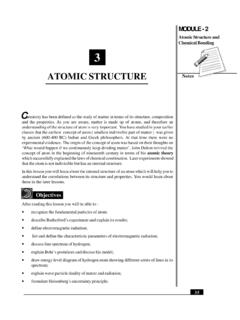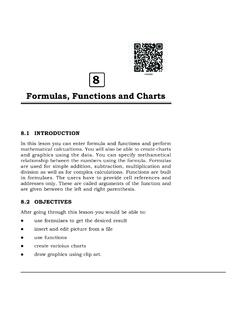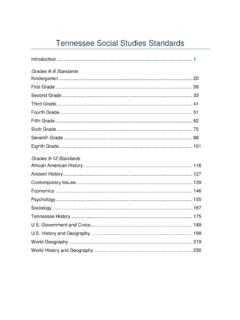Transcription of 12 PUBLIC LAW AND PRIVATE LAW - Home: The National ...
1 MODULE - 3 Classification of Law 163 PUBLIC Law and PRIVATE LawINTRODUCTION TO LAWN otes12 PUBLIC LAW AND PRIVATE LAWIn any legal system the juristic principles are evolved in the context of rightsand the law as command regulates the relationship between individuals and alsothe relationship between individual and the government. The PRIVATE Law ofContract and obligations plays an important role in shaping the socio-economicconditions different from the sphere of PUBLIC Law. In his introduction to Holland on jurisprudence , N R Madhav Menon has pointed out that as perHolland, the State s presence in the sphere of PRIVATE Law is only as arbiter ofthe rights and duties which exists between the citizens.
2 In PUBLIC Law, the Stateis not only the arbiter, but is also one of the parties interested. The rights andduties with which it deals concern itself of the one part and its subjects on theother part, and this union in one personality of the attributes of judge and party,has given rise to the view that the State (Sovereign) not only has no duties, butalso has no rights properly so called. Of the two persons who are the constituentelements of every right, one must always be the State, acting, of course, throughits various functionaries. The PRIVATE Law is continuously evolving. The growthin technology has added new dimensions to the concept and the distinctionbetween PUBLIC and PRIVATE law, both in their Substantive and Procedural aspects,may be inadequate to comprehend these changes.
3 Today the PUBLIC -privateclassification is breaking down and the theory of State as the arbiter of alldisputes is being questioned. In fact, many disputes today are against the Stateand its functionaries. Independent Judiciary has become the key element of ruleof law necessitating the need to re-write jurisprudence originally articulated fromthe point of view of the Sovereign studying this lesson, you will be able to:zexplain the meaning and nature of PUBLIC Law;zexplain the meaning and nature of PRIVATE Law;zunderstand the concept of Constitutional Law;zdiscuss the concept of Administrative Law;INTRODUCTION TO LAWMODULE - 3 PUBLIC Law and PRIVATE LawClassification of Law 164 Noteszdefine Criminal Law.
4 Zlist the differences between PUBLIC and PRIVATE Law; andzdiscuss the role of Judges in shaping MEANING AND NATURE OF PUBLIC LAWP ublic Law is that part of law, which governs relationship between the State(government/government agencies) with its subject and also the relationshipbetween individuals directly concerning the society. According to Loughlin, PUBLIC law is a form of political jurisprudence that incorporates no transcendentalor metaphysical ideas of justice and goodness; it is concerned solely with thoseprecepts of conduct that have evolved through political practice to ensure themaintenance of the PUBLIC realm as an autonomous entity.
5 The PUBLIC Law deals with the social problems in the broad context and mayinclude the following heads: Constitutional Law, Administrative Law, CriminalLaw and Criminal Procedure, Law of the State considered in its quasi privatepersonality, Procedure relating to the State as so considered and Judge short, PUBLIC Law governs relationship between the State with its citizensand also relationship between individuals directly concerning the Law, Administrative Law, Criminal Law and Criminal Procedureare the subject matter of PUBLIC Constitutional LawThe primary function of Constitutional Law is to ascertain the political centerof gravity of any given State postulating the supremacy of law in the functioningof State.
6 In India, the Constitution makes India: Sovereign, Socialist, Secular,Democratic, Republic with a Federal System with Parliamentary form ofGovernment in the Union and the States; and with an Independent Judiciary. Italso establishes the structure, procedures, powers and duties of the governmentand spells out basic human rights which are fundamental in the governance ofNation in the form of Fundamental Rights and Directive Principles of State Law is a branch of PUBLIC Law. It determines the politicalorganization of the State and its powers, while also setting certain substantiveand procedural limitations on the exercise of governing power.
7 ConstitutionalLaw consists of the application of fundamental principles of law based on thedocument, as interpreted by the Supreme Court. In the words of Salmond, Constitutional Law is the body of those legal principles which determine theMODULE - 3 Classification of Law 165 PUBLIC Law and PRIVATE LawINTRODUCTION TO LAWN otesConstitution of a State- , the essential and fundamental portions of the State sorganization. Administrative LawAs per Holland, Administrative Law provides for the manner of activities orthe various organs of the Sovereign Power as provided by the Constitution.
8 Inthis sense Administration has been defined as the exercise of political powerswithin the limits of the Constitution as the total concrete and manifoldly changingactivity of the State in particular cases as the functions, or the activity, of theSovereign Power . It may fairly be said to include the making and promulgationof laws; the action of the government in guiding the State in its foreign relations;the administration of justice; the management of the property and businesstransactions of the State; and the working in detail, by means of subordinatesentrusted with a certain amount of discretion, of the complex machinery bywhich the State provides at once for its own existence and for the generalwelfare.
9 It deals, with the collection of the revenue, the collection of statistic,international trade, manufacturing, pollution, taxation, and the like. This issometimes seen as a sub-category of Civil Law and sometimes seen as PublicLaw as it deals with regulation and PUBLIC institutions. The Administrative Lawsare enforced by the executive branch of a Government rather than the judicialor legislative branches (if they are different in that particular jurisdiction).According to Vago Steven, Administrative Law is a body of the law createdby administrative agencies in the form of regulations, orders, and decisions.
10 Criminal LawThe most important of the functions of the State is that which it discharges asthe guardian of order; preventing and punishing all injuries to itself, and alldisobedience to the rules which it has laid down for the common welfare. Indefining the orbit of its rights in this respect, the State usually proceeds by anenumeration of the acts which infringe upon them, coupled with an intimationof the penalty to which any one committing such acts will be liable. The branchof law which contains the rules about this subject is accordingly described as Criminal law.


